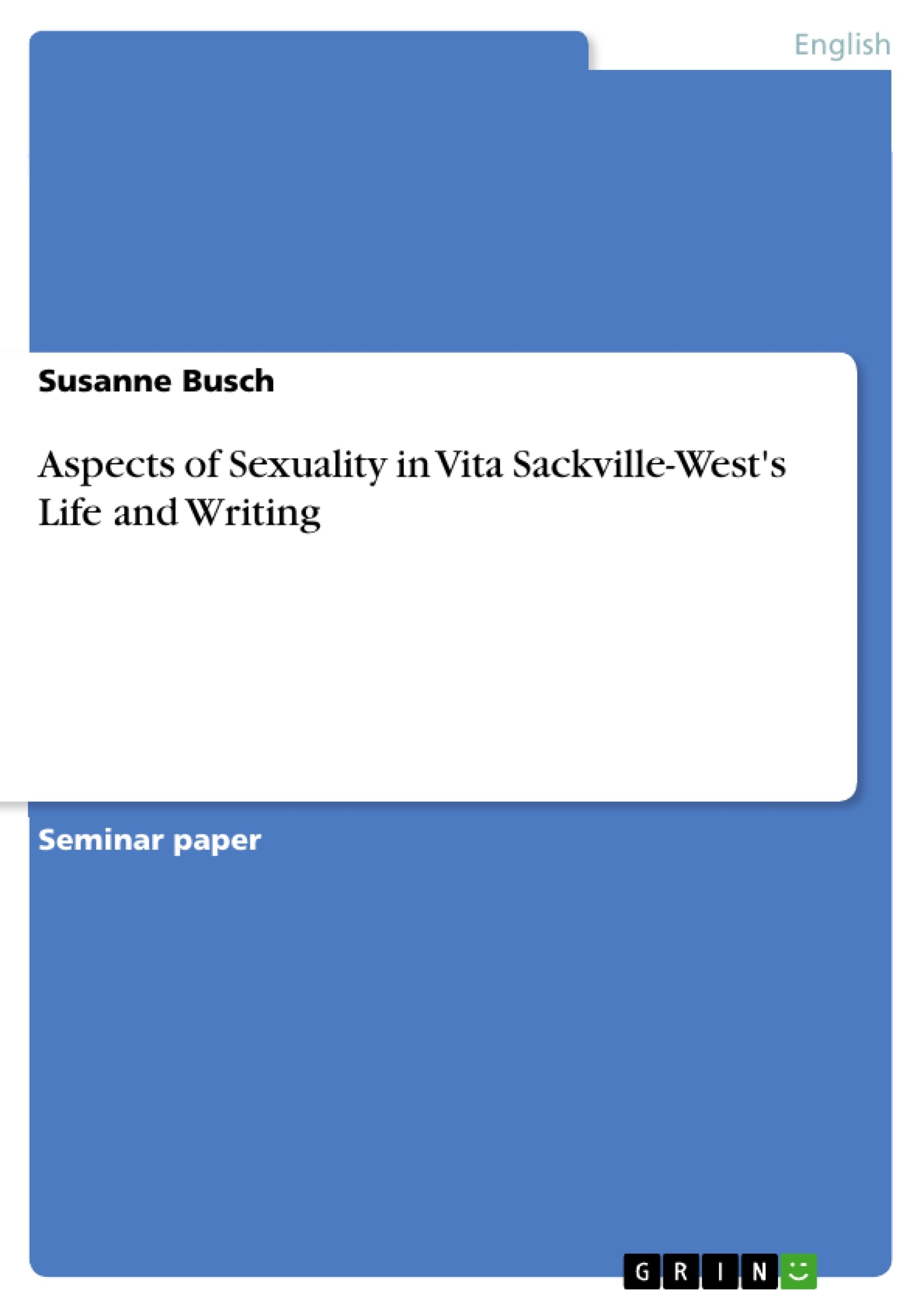This paper aims to analyse some aspects of sexuality in three of Vita Sackville-West’s novels in close connection with the author’s own attitudes towards the topics. The question was whether or not Sackville-West’s ideas and experiences are reflected in her writing. By comparing biographical material about Sackville-West with the contents of her novels, it was possible to find some similarities and common ground. I chose the following three novels in order to discuss the position of women, marriage in general, sadomasochism and female relationships:All Passion Spent(1931),The Dark Island(1934) andNo Signposts in the Sea(1961).
Vita did not need to write because of economic pressure, she was highly privileged and therefore did not have to write anything she did not want to, however, the restrictions social and political principles imposed on her did not allow Vita to use everything she might have imagined to write about.
Although Sackville-West is not representative due to her aristocratic status, she shares the fate of having to live a married life despite being homosexual with most of the lesbians at the beginning of the 20th century. This apparent contradiction arouses the question of how she coped with this duality and whether writing did help her in dealing with the different aspects of her personality.
Inhaltsverzeichnis (Table of Contents)
- ABOUT THE LIFE AND WORKS OF VITA SACKVILLE-WEST
- SUMMARIES OF NOVELS
- All Passion Spent
- The Dark Island
- No Signposts in the Sea
- ANALYSIS OF DIFFERENT ASPECTS OF SEXUALITY IN THE NOVELS
- Position of Women
- Marriage
- New Concept of Love
- Sadomasochism
- Secret Loves: Female Relationships
- General Situation of Lesbianism at Vita Sackville-West's Lifetime
- Homosexuality in Sackville-West's Novels
- CONCLUSION
Zielsetzung und Themenschwerpunkte (Objectives and Key Themes)
This paper explores the depiction of sexuality in three of Vita Sackville-West's novels, examining how her own attitudes towards these topics are reflected in her writing. The central question addressed is whether Sackville-West's personal experiences and beliefs are mirrored in her fictional works. By comparing biographical information with the content of her novels, the paper aims to uncover similarities and common ground. The chosen novels, "All Passion Spent" (1931), "The Dark Island" (1934), and "No Signposts in the Sea" (1961), provide a framework for discussing themes such as the position of women, marriage, sadomasochism, and female relationships.
- The representation of female agency and societal constraints in the context of Victorian and early 20th-century Britain.
- Exploration of marriage as an institution and its impact on individuals, particularly women, within a historical framework.
- Examination of unconventional love dynamics, including sadomasochism and female relationships, as portrayed in the novels.
- Analysis of how Sackville-West's own experiences with sexuality and gender roles influence her writing and character development.
- Understanding the historical and societal context surrounding lesbianism and its portrayal in literature.
Zusammenfassung der Kapitel (Chapter Summaries)
The first chapter focuses on the life and works of Vita Sackville-West, providing biographical details and insights into her early life, including her upbringing in Knole House, her childhood experiences, and her burgeoning interest in writing. It also explores her relationships with significant figures in her life, particularly her female lover, Rosamund Grosvenor, and Harold Nicolson, who later became her husband.
The second chapter presents summaries of three of Sackville-West's novels, "All Passion Spent," "The Dark Island," and "No Signposts in the Sea," focusing on their narrative elements, main characters, and key plot points. It briefly touches upon themes and motifs present in each novel without providing extensive details or spoilers.
The third chapter delves into the analysis of different aspects of sexuality as depicted in the chosen novels. It explores how Sackville-West portrays the position of women in society, the institution of marriage, and unconventional love dynamics like sadomasochism and female relationships. This chapter also examines the historical and social context surrounding lesbianism and its representation in Sackville-West's works.
Schlüsselwörter (Keywords)
The core themes and concepts explored in this paper revolve around sexuality, gender, and social constraints in Victorian and early 20th-century Britain. Key topics include the position of women, marriage, unconventional love dynamics, lesbianism, and the impact of historical and societal context on individual lives and artistic expression. Vita Sackville-West's own experiences and her portrayal of these themes through her novels are central to the paper's analysis.
Frequently Asked Questions
Which novels of Vita Sackville-West are analyzed in this paper?
The analysis focuses on "All Passion Spent" (1931), "The Dark Island" (1934), and "No Signposts in the Sea" (1961).
How are Sackville-West's personal experiences reflected in her writing?
The paper compares biographical material with her fiction to find similarities regarding marriage, homosexuality, and the position of women in society.
What was the general situation of lesbianism during her lifetime?
The paper examines the social and political restrictions of the early 20th century, which forced many lesbians, including Sackville-West, to live traditional married lives.
Does the paper discuss unconventional themes like sadomasochism?
Yes, the analysis of "The Dark Island" and other works includes a discussion of sadomasochism and unconventional love dynamics.
How did Sackville-West's aristocratic status influence her work?
While highly privileged and free from economic pressure to write, she was still bound by the social principles and restrictions of her class.
What is the central question regarding her "duality"?
The paper explores how she coped with the duality of being a married woman while being homosexual, and whether writing helped her deal with these conflicting aspects of her personality.
- Quote paper
- Susanne Busch (Author), 2004, Aspects of Sexuality in Vita Sackville-West's Life and Writing, Munich, GRIN Verlag, https://www.grin.com/document/55609



